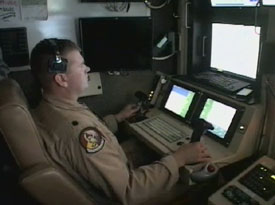In This Episode << SLIDE LEFT TO SEE ADDITIONAL SEGMENTS
The Ethics of Drones
KIM LAWTON, correspondent: Drones are increasingly becoming some of the most valuable weapons in America’s arsenal.
Drone operator speaking on video: This is going to save someone’s life today.
LAWTON: Unmanned aircraft such as the Predator and the Reaper can hover over remote areas and do surveillance for hours, even days. Their operators are often in places as far away as Nevada or Virginia, and the drones can release missiles or bombs with no risk to those operators. Experts say within 20 years the vast majority of America’s fighting aircraft will likely be pilotless. The use of drones may be strategic, but is it moral?
PROFESSOR EDWARD BARRETT (US Naval Academy Center for Ethical Leadership): If you believe that a society has a duty to reduce unnecessary risk to its combatants, then these systems do that, so that would be actually one moral obligation, and then also the state has an obligation to effectively and efficiently defend its citizens, and these systems are effective and efficient.
PROFESSOR MARY ELLEN O’CONNELL (University of Notre Dame Law School): To accept killing far from the situation of battlefields where there is an understanding of necessity is really ethically troubling for many of us.
LAWTON: America’s use of remotely piloted aircraft or drones has increased dramatically since President Obama took office. Both the military and the CIA use them in combat operations and counterterrorism missions. Drones have been engaged in lethal operations in at least six countries: Afghanistan, Iraq, Yemen, Somalia, Pakistan, and Libya. Retired Lieutenant General David Deptula oversaw the US Air Force’s drone program from 2006 until last year. He says remotely piloted aircraft achieve a moral good.
 LIEUTENANT GENERAL DAVID DEPTULA: The precision, the persistence, and the accuracy that remotely piloted aircraft bring to the equation actually enhance our ability to accomplish our objectives while minimizing loss of life.
LIEUTENANT GENERAL DAVID DEPTULA: The precision, the persistence, and the accuracy that remotely piloted aircraft bring to the equation actually enhance our ability to accomplish our objectives while minimizing loss of life.
LAWTON: Yale Law School Professor Stephen Carter, author of the book “The Violence of Peace,” agrees that minimizing risk to US troops is a worthy goal. But he says it also has moral implications that should not be ignored.
PROFESSOR STEPHEN CARTER (Yale Law School): When America has troops on the ground and people are dying as well as killing, it’s on the news every day. When we’re using standoff bombing, when we’re using missiles that kill but place no risk, it fades from the nation’s consciousness. That means it’s easier to fight, which means it’s more likely that we’ll fight.
LAWTON: Notre Dame Professor of International Law Mary Ellen O’Connell worries that the growing availability of unmanned aerial systems lowers political and psychological barriers to killing.
O’CONNELL: These sleek, attractive, small glider-like planes fly out of their hanger and slip in to a village somewhere and drop a bomb. That seems so easy to do, and on the screen it doesn’t look any different than the video game that the soldier plays later at her home.
 DEPTULA: Are these people arguing that, you know, we should only fight if you are exposed to threats and putting your life at risk? That’s silly, and I think it’s ill-founded.
DEPTULA: Are these people arguing that, you know, we should only fight if you are exposed to threats and putting your life at risk? That’s silly, and I think it’s ill-founded.
LAWTON: Edward Barrett is director of strategy and research at the US Naval Academy’s Stockdale Center for Ethical Leadership. He says, in fact, high-tech sensors on the drones give operators a very detailed picture of what they are doing.
BARRETT: So they’re operating from afar, but their senses are very close to the situation. They see very clearly the battle damage that they are doing, and therefore they know they’re not playing a video game.
LAWTON: He says the distance allows operators to make moral decisions about the use of force.
BARRETT: A soldier in the situation is scared and possible hasty in deciding what to do and acting and possibly even angry, whereas an operator who’s not threatened can use tighter rules of engagement and is not going to be fearful and therefore is going have a much cooler head.
LAWTON: Deptula says much ethical oversight surrounds the US military’s use of drones.
DEPTULA: You have many, many more sets of eyes that are watching what’s going on and many, many more people in the decision loop in terms of employing lethal ordnance if, in fact, that is going to be applied.
LAWTON: O’Connell says she supports the use of drones in combat situations like Afghanistan. But she argues that their use in non-combat settings, such as Pakistan, is morally and legally wrong.
 O’CONNELL: International law says that on a battlefield in which armed groups are engaged in organized armed fighting we have a presumption of necessity that persons may be killed without warning in that situation. You can ask any member of the United States armed forces where are we engaged in combat today, and they will all tell you Libya, Iraq, and Afghanistan. They will not tell you Pakistan.
O’CONNELL: International law says that on a battlefield in which armed groups are engaged in organized armed fighting we have a presumption of necessity that persons may be killed without warning in that situation. You can ask any member of the United States armed forces where are we engaged in combat today, and they will all tell you Libya, Iraq, and Afghanistan. They will not tell you Pakistan.
LAWTON: The CIA oversees drone strikes as part of counterterrorism operations, but US officials refuse to discuss the program publicly. According to a tally by the nonpartisan New America Foundation, since 2004 there have been more than 260 US drone strikes in Pakistan, which the foundation estimates killed between 1,600 and 2,500 people. The strikes have generated strong protests from Pakistanis who claim that many civilians as well as militants have been killed. The US takes the position that those strikes are permissible as part of the war against terror.
DEPTULA: Our principal adversary since bin Laden has declared war on the US in the mid-nineties has been al Qaeda. It is fully in cognizance with the laws of international armed conflict to pursue those individuals wherever they reside.
O’CONNELL: They’ve actually been lulled into a sense that killing with drones is not extraordinary, that these are bad people as determined by our CIA, and therefore we can just kill them. This is killing large numbers of persons who we would never allow to be killed if they were in another geographic zone—if they were in the United States, for example.
 CARTER: You need really good intelligence on where those missiles are going, because otherwise you’re going to blow up a lot of wedding processions and make a lot of enemies instead of hitting the al-Qaeda leader who you thought was in the car but really wasn’t.
CARTER: You need really good intelligence on where those missiles are going, because otherwise you’re going to blow up a lot of wedding processions and make a lot of enemies instead of hitting the al-Qaeda leader who you thought was in the car but really wasn’t.
LAWTON: The New America Foundation estimates that while the civilian mortality rate from drone strikes in Pakistan had been about 20 percent, last year it fell to about five percent. As drone technology advances, even more difficult questions may lie ahead.
BARRETT: Perhaps more ethically challenging is the issue of autonomous lethal systems. The idea is that you can use software that recognizes the targets and then makes a decision that’s ethical to destroy targets, with no human intervention.
LAWTON: Wherever the technology goes, ethicists say the moral dimensions must be a significant part of the discussion.
O’CONNELL: We have to be aware of what these technologies are capable of and what they’re doing and demand of our leaders that our ethical, moral, and legal principles that we hold dear, that are the basis of this country, remain uppermost in all of our minds.
LAWTON: Carter believes the principles of the just war doctrine, which have informed military policy for centuries, are still relevant for determining when to use drones.
CARTER: Is there a just cause? Is this the last resort? Can the use of force actually do the thing that we claim we are setting out to do? And is our use of force proportional to the problem we are trying to solve? When we ask questions like that we’re asking moral questions. I think those are the right questions to ask.
LAWTON: The Department of Defense currently has about 8,300 remotely piloted aircraft, not including the CIA’s, and plans to spend about $6 billion in 2012 adding to that inventory.

